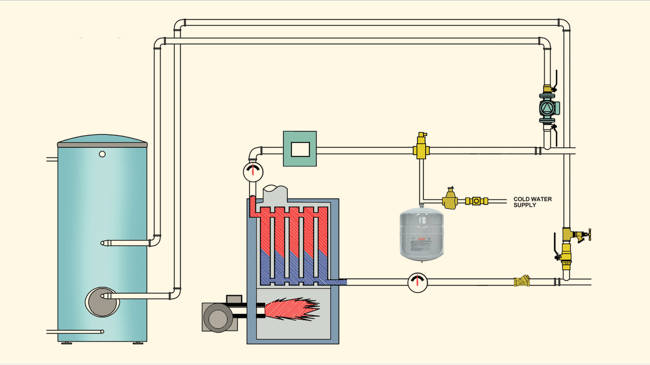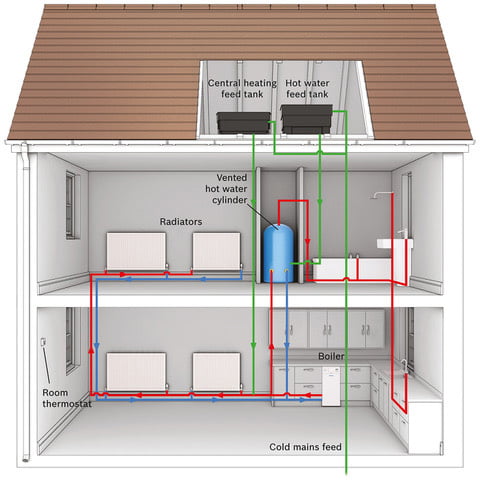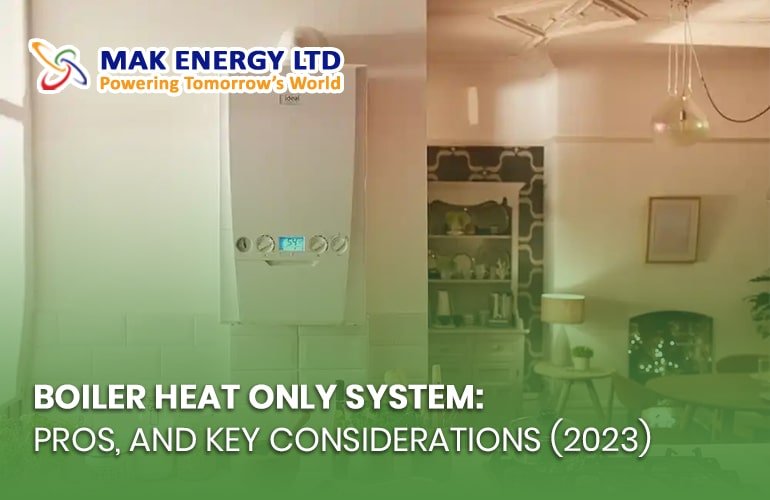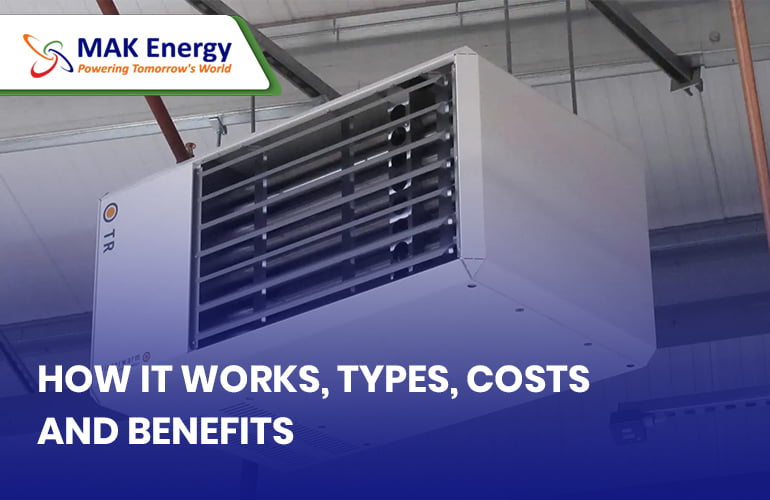Last updated: January 9th, 2024 at 11:38 am
A heat only boiler, also known as a regular or conventional boiler, is a type of boiler that is specifically designed to provide heating for a property. It is called “heat only” because its primary function is to generate heat for the central heating system, without providing hot water for domestic use.
Heat only boilers are commonly found in older properties that have traditional heating systems, such as radiators and a separate hot water cylinder. They work by heating water and circulating it through the radiators to provide warmth to the rooms.
Unlike combi boilers or system boilers, heat only boilers do not have an integrated hot water storage tank. Instead, they require a separate hot water cylinder, often located in an airing cupboard or elsewhere in the property. This cylinder stores and supplies the domestic hot water to taps, showers, and other hot water outlets.
Heat only boilers are usually connected to a cold water storage tank (also known as a feed and expansion tank) in the loft. This tank supplies cold water to the boiler, which is then heated and circulated through the radiators in a more energy efficient way.

Boiler heat only systems have been a popular choice for heating residential and commercial spaces. In this blog post, we will explore the types, advantages, disadvantages and important factors to consider when opting for a heat only boiler system. Whether you are considering a new installation or contemplating a switch, this guide will provide you with valuable insights to make an informed decision.

How Does a Heat Only Boiler Work?
Heat only boilers work by heating water and then circulating it throughout a residence via a system that incorporates an array of controls, including motorized valves, pumps, and tanks. The mains supply provides water to a cold-water tank situated in the loft, which then feeds it into a hot water cylinder. Subsequently, the boiler heats the hot water cylinder, allowing hot water to be supplied to taps and showerheads whenever required. Additionally, when the heating is activated, a pump circulates heated water to the radiators.
Pros of Boiler Heat Only Systems
- Energy Efficiency: Boiler heat only systems are known for their high energy efficiency. By effectively utilizing the fuel source, they can provide efficient heating, resulting in potential energy savings and reduced utility bills. This efficiency is particularly advantageous in colder climates or regions with long heating seasons.
- Even and Comfortable Heat Distribution: One of the significant advantages of boiler heat only systems is their ability to provide even heat distribution. Through the use of radiators or underfloor heating, these systems ensure that every corner of your space is kept comfortably warm, eliminating cold spots and drafts.
- Domestic Hot Water Supply: Many heat only boiler systems are designed to provide domestic hot water in addition to space heating. This integration eliminates the need for separate water heaters and allows for a streamlined and efficient central heating system.
- Compatibility with Radiators and Underfloor Heating: Boiler heat only systems seamlessly integrate with traditional radiators and modern underfloor heating systems. This flexibility provides homeowners with options to choose the heating method that best suits their preferences and requirements.
- Reduced Risk of Airborne Allergens: Unlike forced-air heating systems that circulate air, boiler heat only systems do not blow air around. This characteristic reduces the risk of airborne allergens, making them a preferred choice for individuals with respiratory sensitivities or allergies.
Cons of Boiler Heat Only Systems
- Initial Installation: The upfront cost of installing oil, Electric or gas boilers heat only system can be higher compared to other central heating systems. This is due to the complexity of the installation process, including the need for pipework, expansion vessel, radiators, and potentially underfloor heating systems. However, it’s essential to consider the long-term energy savings and efficiency benefits.
- Space Requirements: Boiler heat only systems typically require dedicated space for the boiler unit, feed and expansion tank / expansion vessel and associated equipment. This consideration should be taken into account during the planning phase, especially if space is limited in your property.
- Limited Cooling Options: Unlike some heating and cooling systems, boiler heat only systems focus solely on providing heat. If you require cooling capabilities during the summer months, additional solutions like separate air conditioning units or heat pumps may be necessary.
- Dependency on a Single Heating Source: Boiler heat only systems rely on a single heating source, such as gas, oil, or electricity. This means that a disruption or failure of the fuel source can temporarily interrupt the heating supply. It’s crucial to have backup plans or alternative heating options in place to mitigate such situations.
- Potential for System Leaks and Maintenance Needs: Boiler heat only systems involve a network of pipework and components that may be susceptible to leaks or require periodic maintenance. Regular inspections, maintenance, and addressing any leaks promptly are crucial to ensure the system’s optimal performance and longevity.
Key Considerations when Choosing a Boiler Heat Only System
Heating Capacity and Size
Assessing the heating capacity and size of the boiler is vital to ensure it can adequately meet your space heating requirements. Factors such as insulation, room sizes, and climate should be considered to determine the appropriate size.
Fuel Type Options (Gas, Oil, Electric)
Evaluate the available fuel options in your area and consider their availability, cost, and environmental impact. Each fuel type has its own set of pros and cons, so choose the one that aligns with your preferences and budget.
Efficiency Ratings and Energy Savings
Look for boilers with high efficiency ratings, such as an AFUE (Annual Fuel Utilization Efficiency) rating. Higher energy efficient boilers can help you save on energy consumption and reduce your heating costs over time.
Maintenance and Servicing Requirements
Consider the maintenance and servicing needs of the boiler heat only system. Regular maintenance, such as annual inspections and cleaning, is essential to ensure the system operates efficiently and prolong its lifespan. Additionally, inquire about the availability of qualified technicians in your area for repairs and servicing.
Compatibility with Existing Infrastructure
If you have an existing heating system or infrastructure in place, assess whether a boiler heat only system can seamlessly integrate with it. Understanding compatibility issues beforehand can save you time and the installation process could be even more cost effective.
Budget and Cost Factors
Determine your budget for the boiler heat only system, including the installation costs, feed and expansion tank cost, equipment, and any additional components required. Compare quotes from different suppliers and consider the long-term energy savings to make an informed decision.
Environmental Impact and Sustainability
Consider the environmental impact of the boiler heat only system and opt for models that prioritize sustainability. Look for boilers that are energy efficient, utilize renewable energy sources where possible, and have low carbon emissions.
Types of Heat Only Boiler
There are two commonly used heat boilers in the UK.
Open Vented Heat Only Boilers
If you possess an open vented heating system, the inclusion of a feed and expansion tank guarantees the maintenance of consistent water levels within the system. Its primary function is to replace any lost water resulting from evaporation or leaks. Additionally, it ensures that the expansion of water due to heating does not result in an excessive build-up of pressure.
Sealed Heat Only Boilers
A sealed system employs an expansion vessel as an alternative to a feed and expansion tank. This vessel, which can either be integrated within the boiler or exist as a separate containment unit, offers ample space to accommodate the expansion of water when the system undergoes heating.
Top Heat Only Boilers in UK
- Grant Vortex Eco Utility 90-120 Boiler Only VTXECO26/35
- EHC Slim Jim 7kW Single-Phase Electric Heat Only Flow Boiler
- Worcester Bosch Greenstar 27Ri Gas·
- Baxi 816 16kW Gas Heat Only Boiler 7749866
FAQs
Which Homes Are Most Suited for Heat Only Boilers?
If you reside in an area characterized by notably low water pressure, a heat only boiler is often a suitable choice for your home. By utilizing water from a cold-water storage tank to fill the cylinder instead of directly sourcing it from the mains, this type of boiler can effectively address the challenges posed by low water pressure.
Are There Any Drawbacks to A Heat Only Boiler?
It’s important to note that heat only gas boilers have a limitation in terms of hot water supply since they draw water from a cylinder rather than directly from the mains. Once the hot water stored in the cylinder is exhausted, the boiler will need to refill it with cold water and heat it to the desired temperature for taps and showerheads.
Furthermore, it is worth considering that if you have minimal hot water consumption, a heat only boiler may not be the most efficient heating solution. This is because the cylinder may heat a larger volume of water than you actually require, whereas a combi boiler will provide only the necessary amount of water.
What Size Heat Only Boiler Do I Need?
As a general guideline, a small or medium-sized home with up to 10 radiators typically requires a 24-30 kW boiler. On the other hand, a larger home with up to 20 radiators may necessitate a larger 35-42 kW boiler. However, it’s important to note that boiler size is influenced by various other factors. Factors to consider include the number of occupants in your home, the type of building (e.g., terraced, semi-detached), the level of insulation, the type of boiler weather it is electric, oil or gas boilers and the age of the property. For instance, if you reside in a terraced house, it may retain heat more effectively due to being surrounded by neighboring properties. This may indicate that a smaller boiler size would suffice.
How Often Should I Service My Heat Only Boiler?
It is strongly advised to have your boiler serviced annually. These devices play a crucial role in maintaining a warm and comfortable home, which is why it is essential to take proper care of them for various reasons. An annual service ensures the safety and efficient operation of your heat boilers, providing the hot water and heating you require while also preserving its parts and labor warranty. Booking a service for your Ideal boiler online is a quick and effortless process, granting you peace of mind.
What Are the Benefits of Heat Boilers?
Suitable For Larger Households and Businesses
The presence of a dedicated hot water tank in conjunction with a heat-only boiler enables multiple taps, showers, or baths to access hot water simultaneously. This makes regular boilers an excellent choice for accommodating larger families and commercial establishments.
Effective In Areas with Low Water Pressure
The inclusion of a cold-water cistern (header tank) allows the storage of water from the mains before supplying it to the heat-only boiler. Consequently, regular boilers prove advantageous for residences situated in regions with low water pressure.
Support For a Backup Heater
The option to install an immersion heater in the hot water tank provides a valuable contingency plan in case of boiler malfunctions or downtime.
Compatibility With Older Radiators
Traditional-style radiators can experience leaks when connected to modern boilers due to the higher pressure exerted. However, regular boilers are designed to work seamlessly with older heating systems, ensuring compatibility and preventing issues.
Integration With Solar Thermal Systems
Regular boilers can effectively harness energy from solar thermal systems like rooftop arrays. This environmentally-friendly feature empowers homeowners to reduce their carbon emissions and embrace sustainable practices.
Conclusion
In conclusion, boiler heat only systems have several advantages, including energy efficiency, even heat distribution, domestic hot water supply, and reduced risk of airborne allergens. However, it’s essential to consider the cons, such as the initial installation cost, space requirements, limited cooling options, dependency on a single heating source, and potential maintenance needs.
When choosing a heat only system boiler, carefully consider factors like heating capacity and size, fuel type options, efficiency ratings, maintenance requirements, compatibility with existing infrastructure, budget, and environmental impact. Consulting with professionals in the heating industry can provide valuable insights and help you make an informed decision.
Ultimately, the suitability of a boiler heat only system depends on your specific needs, preferences, and circumstances. By weighing the pros and cons and considering the key considerations outlined in this blog post, you can determine whether a heat only system boiler is the right choice for your heating requirements. Remember, investing in a boiler heat only system is a long-term decision, so it’s important to conduct thorough research and consult with professionals to ensure you select the best option for your home or commercial space.




